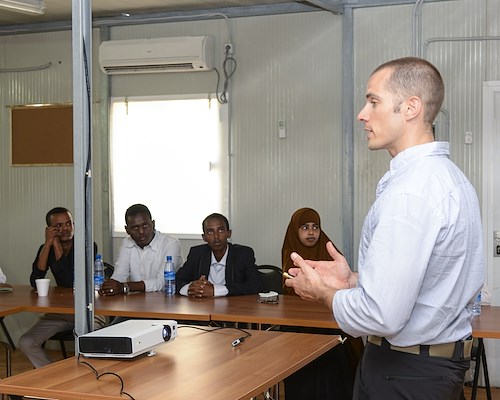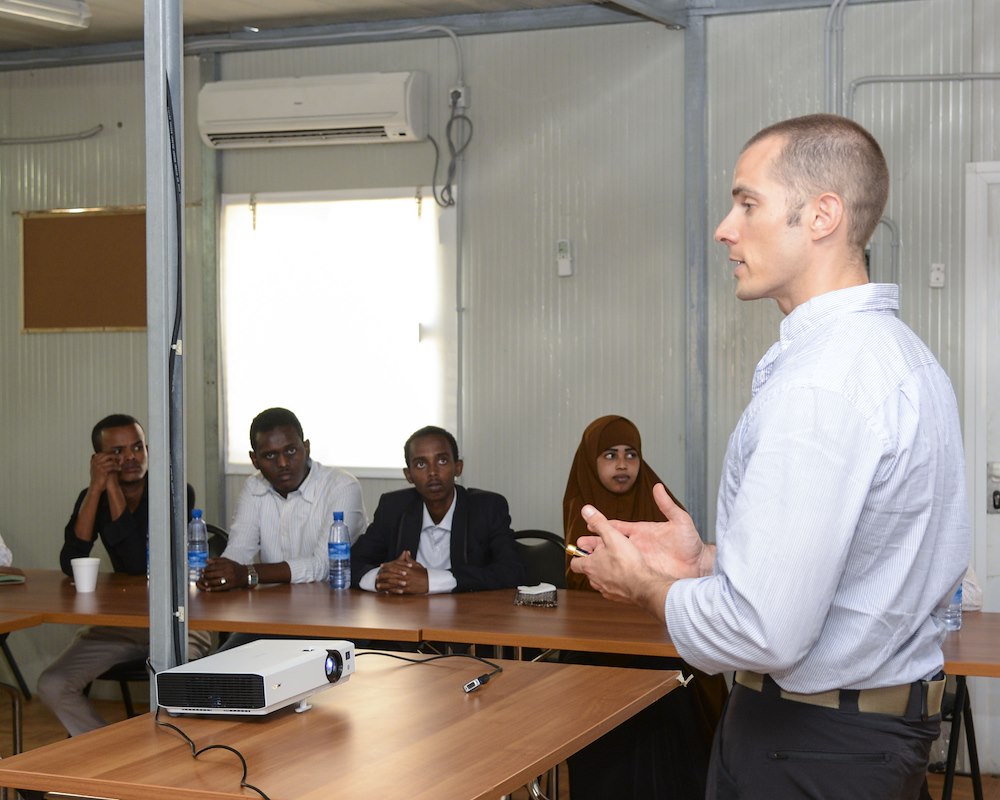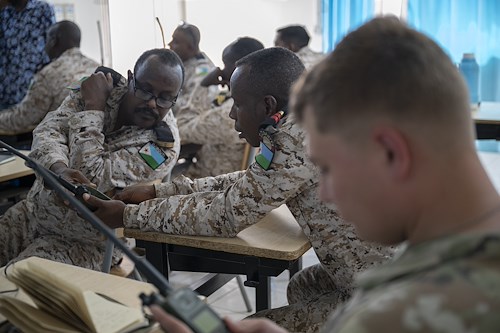Gallery contains 3 images
×
Photo 1 of 3
Combined Joint Task Force - Horn of Africa Image
U.S. Army Maj. Andrew Mosier, 403rd Civil Affairs Battalion physician, instructs Somali doctors during the Continuing Medical Education Conference in Mogadishu, Somalia, Sept. 14, 2016. The conference brought nearly 20 medical students and general practitioners from various sectors of Somalia together to receive training on various medical practices, specifically in the fields of radiology and pediatrics. (U.S. Air Force photo by Staff Sgt. Benjamin Raughton)
Photo by: Staff Sgt. Benjamin Raughton
Photo 2 of 3
Combined Joint Task Force - Horn of Africa Image
Doctors, attendees and facilitators of the Continued Medical Education conference pose for a photo in Mogadishu, Somalia, Sept. 14, 2016. The conference brought nearly 20 medical students and general practitioners from various sectors of Somalia together to receive training various medical practices, specifically in the field of radiology and pediatrics. (U.S. Air Force photo by Staff Sgt. Benjamin Raughton)
Photo by: Staff Sgt. Benjamin Raughton
Photo 3 of 3
Combined Joint Task Force - Horn of Africa Image
U.S. Army Maj. Andrew Mosier, 403rd Civil Affairs Battalion physician, instructs nearly 20 Somali doctors during the Continuing Medical Education Conference in Mogadishu, Somalia, Sept. 14, 2016. The conference covered topics concerning treatment for different types of broken bones, swollen lymph nodes, and arthritis, and they also practiced reading radiographs. (U.S. Air Force photo by Staff Sgt. Benjamin Raughton)
Photo by: Staff Sgt. Benjamin Raughton
The Combined Joint Task Force-Horn of Africa J3 Military Coordination Cell, along with the United Nations Support Office in Somalia (UNSOS), hosted the year’s third Continuing Medical Education Conference Sept. 14, 2016, in Mogadishu, Somalia.
The conference brought 20 medical students and general practitioners from various sectors of Mogadishu together to receive training on various medical practices, specifically in the fields of radiology and pediatrics.
“These are 20 young physicians, all within one year of graduation from medical school or within two years of having graduated medical school, and this serves to empower them with basic—but vital—knowledge about primary care radiology, allowing them to more effectively treat hundreds of patients,” said U.S. Army Maj. Andrew Mosier, 403rd Civil Affairs Battalion physician.
Mosier said that if patients feel as though they have a true doctor-patient relationship stemming from a fully-competent physician, they will be less likely to seek monetary or healthcare support from extremist organizations.
“Ultimately, the goal is to give Somali physicians and their patients increased access to better quality social services, especially health care,” he said.
The conference covered topics related to primary care radiology, including common manifestations of pulmonary disease and illness on chest x-rays and CT scans, commonly missed broken bones, swollen lymph nodes, arthritis, and cervical spine trauma. The event culminated with a practical exercise where all participants took turns interpreting their own radiology study.
“Our goal is to update junior and senior doctors,” said Asha Omar, a UNSOS obstetric gynecologist who helped coordinate the CME conference. “More importantly, [the] junior doctors, because they are new in the profession. They are young and went to university a maximum of two to three years ago, so they have many things to learn about medicine. I want them to have as much training as possible and many opportunities to learn.”
Dr. Abdi Alasow, a medical general practitioner, attended the conference to expand his knowledge of radiology.
“This training is important because, here in Somalia, we don’t have a lot of technicians for medical equipment like x-rays, MRIs or ultrasounds. So it’s very important for me and for others to understand and get some more information on how to use this [equipment], how to read the x-ray, and to see the differences between diseases like pneumonia or cancer,” he said.
Abdi added that the conference greatly benefits Somali physicians, as there are few medical schools in the region. To compound the problem, Abdi said, there is only one radiologist in all of Mogadishu.
Abdi said it’s very important to train the medical community so they’re instructed in a specific practice. This is because Somalia has so few doctors, and the lack of medical education also presents problems on the front lines, as African Union or Somali National Army casualties may have multiple injuries.
“It’s imperative to continue this education,” Abdi said. “I’m looking forward to continuing this conference in the future and also [to] learn other specialties. This will help when emergencies or accidents develop.”
With consistent and effective training practices and regular meetings, the CME conference looks to spread medical education beyond Mogadishu.
“I want each one of these physicians to walk away from here fully confident to find every common radiology finding, as well as every emergent finding for x-rays that a primary care physician would see on a daily basis,” Mosier said.














